Best PHP Scripts
Best PHP scripts exist Rapid PHP, PHPStorm, Eclipse PHP, NuSphere, and Apache NetBeans. These PHP scripts are used to develop dynamic and interactive websites. They are among the first server-side languages that could be embedded into HTML, making adding functionality to web pages easier without calling external files for data.



No Cost Personal Advisor
List of 20 Best PHP Scripts
Emergents | 2024
PHP Software for Boosting Your Productivity
Rapid PHP is a revolutionizing PHP code editor. The clutter-free software offers a host of useful features, including language tools, text editor, file management, plugin support, inbuilt preview, real-time PHP syntax checker, keystroke savers, and much more. Learn more about Rapid PHP
Explore various Rapid PHP features, compare the pricing plans, and unlock the potential of seamless operations by selecting the right software for your business.
Rapid PHP Caters to
- StartUps
- SMBs
- Agencies
- Enterprises
Contenders | 2024
A Super Intelligent PHP Software
PhpStorm is a leading PHP IDE software designed to boost your productivity. The all-inclusive software is intelligent enough to comprehend your code. Its inbuilt developer tools help you perform multiple routine tasks. Also offers a free 30-day trial period. Read PhpStorm Reviews
Explore various PhpStorm features, compare the pricing plans, and unlock the potential of seamless operations by selecting the right software for your business.
PhpStorm Caters to
- StartUps
- SMBs
- Agencies
- Enterprises
Contenders | 2024
A Feature-packed PHP Software Solution
Eclipse PHP is a state-of-the-art PHP development platform. The software is known for its remarkable features such as code navigation, syntax highlighting/validation, PHP debugging/profiling, code templates, refactoring, remote projects, and much more. Read Eclipse PHP Reviews
Explore various Eclipse PHP features, compare the pricing plans, and unlock the potential of seamless operations by selecting the right software for your business.
Eclipse PHP Caters to
- StartUps
- SMBs
- Agencies
- Enterprises
Emergents | 2024
A Free and Open Source PHP Software
Apache NetBeans is a sophisticated PHP platform designed to help you develop desktop, web, and mobile applications quickly and with ease. This open-source PHP tool offers a user-friendly interface and can be easily integrated with external tools and services. Learn more about Apache NetBeans
Explore various Apache NetBeans features, compare the pricing plans, and unlock the potential of seamless operations by selecting the right software for your business.
Apache NetBeans Caters to
- StartUps
- SMBs
- Agencies
- Enterprises
Contenders | 2024
Scripts by Sublime HQ Pty Ltd
Sublime Text is one of the best IDE tools for programmers and developers. This all-inclusive software offers a highly customizable cross-platform user-interface to add to your convenience. It is compatible with Linux, Windows, and Mac. Read Sublime Text Reviews
Explore various Sublime Text features, compare the pricing plans, and unlock the potential of seamless operations by selecting the right software for your business.
Sublime Text Caters to
- StartUps
- SMBs
- Agencies
- Enterprises
Emergents | 2024
One of the Fastest PHP IDE and PHP Editor
phpDesigner 8 is a PHP software known for its speed and user-friendly interface. This award-winning software comes with inbuilt CSS3-, HTML5- & JavaScript editors to help you build eye-catching websites. Php Designer 8 also offers a free trial period. Read phpDesigner Reviews
Explore various phpDesigner features, compare the pricing plans, and unlock the potential of seamless operations by selecting the right software for your business.
phpDesigner Caters to
- StartUps
- SMBs
- Agencies
- Enterprises
Contenders | 2024
Scripts by GitHub, Inc
Atom Editor is a powerful IDE software that provides programmers & developers with a comprehensive set of tools. The software comes with cross-platform editing features, file system browser, smart auto-completion feature, & find, replace, & preview feature. Read Atom Editor Reviews
Explore various Atom Editor features, compare the pricing plans, and unlock the potential of seamless operations by selecting the right software for your business.
Atom Editor Caters to
- StartUps
- SMBs
- Agencies
- Enterprises
Contenders | 2024
Scripts by Amazon Web Services
AWS Cloud9 is an impressive IDE software that facilitates real-time code collaboration. The feature-filled software comes with a code editor, terminal, debugger, and all necessary programming language tools, such as Python, JavaScript, PHP, etc. Read AWS Cloud9 Reviews
Explore various AWS Cloud9 features, compare the pricing plans, and unlock the potential of seamless operations by selecting the right software for your business.
AWS Cloud9 Caters to
- StartUps
- SMBs
- Agencies
- Enterprises
Emergents | 2024
Scripts by SmartKoders
CodeLite is an easy to use PHP IDE platform known for its efficiency. The free, lightweight IDE software supports all major compilers. Its cross-platform compatibility enables developers to run the software smoothly on OSX, Windows, and Linux. Learn more about CodeLite
Explore various CodeLite features, compare the pricing plans, and unlock the potential of seamless operations by selecting the right software for your business.
CodeLite Caters to
- StartUps
- SMBs
- Agencies
- Enterprises
Emergents | 2024
Scripts by Geany
Geany is a flexible, powerful, and stable IDE software known for its rich features. The software has been designed to help developers accelerate their workflow. Geany runs smoothly on Windows, Linux, and macOS, and supports over 50 programming languages. Learn more about Geany
Explore various Geany features, compare the pricing plans, and unlock the potential of seamless operations by selecting the right software for your business.
Geany Caters to
- StartUps
- SMBs
- Agencies
- Enterprises
Contenders | 2024
IDE, editor, free, HTML, CSS, PHP, JavaScript
CodeLobster IDE is an advanced free multi-platform IDE for working with PHP, HTML, CSS, JavaScript files and includes special plug-ins for Drupal, Joomla, JQuery, AngularJS, CodeIgniter, CakePHP, Laravel, Magento, Symfony, Twig, Yii and WordPress. Read CodeLobster IDE Reviews
Explore various CodeLobster IDE features, compare the pricing plans, and unlock the potential of seamless operations by selecting the right software for your business.
Features
View all CodeLobster IDE Features- Web App Development
- Software Development
- Debugging
- Real Time Editing
- Application Development
- Software Prototyping
- Code Refactoring
Pricing
Plug-ins update
$ 20
License/Year
CodeLobster IDE Caters to
- StartUps
- SMBs
- Agencies
- Enterprises
Emergents | 2024
Scripts by Axway
Aptana is a fully featured App Development Software designed to serve Enterprises, Agencies. Aptana provides end-to-end solutions designed for Web App. This online App Development system offers Debugging, Web App Development at one place. Learn more about Aptana
Explore various Aptana features, compare the pricing plans, and unlock the potential of seamless operations by selecting the right software for your business.
Features
View all Aptana Features- Access Controls/Permissions
- Reporting/Analytics
- Web App Development
- Application Development
- Performance Management
- Resource Management
- Debugging
- Requirements Management
Aptana Caters to
- StartUps
- SMBs
- Agencies
- Enterprises
Emergents | 2024
Deploy your website updates within minutes
EDO4 is a software that helps DevOps engineers and other web developers to perform their day-to-day tasks: add team members, log changes, deploy website changes and work on the projects together. Learn more about EDO4
Explore various EDO4 features, compare the pricing plans, and unlock the potential of seamless operations by selecting the right software for your business.
Features
View all EDO4 Features- Approval Workflow
- KPIs
- Troubleshooting Reports
- Prioritization
- Dashboard
- Portfolio Management
- Release Management
- Policy Management
Pricing
Premium
$ 5
Per Month
EDO4 Caters to
- StartUps
- SMBs
- Agencies
- Enterprises
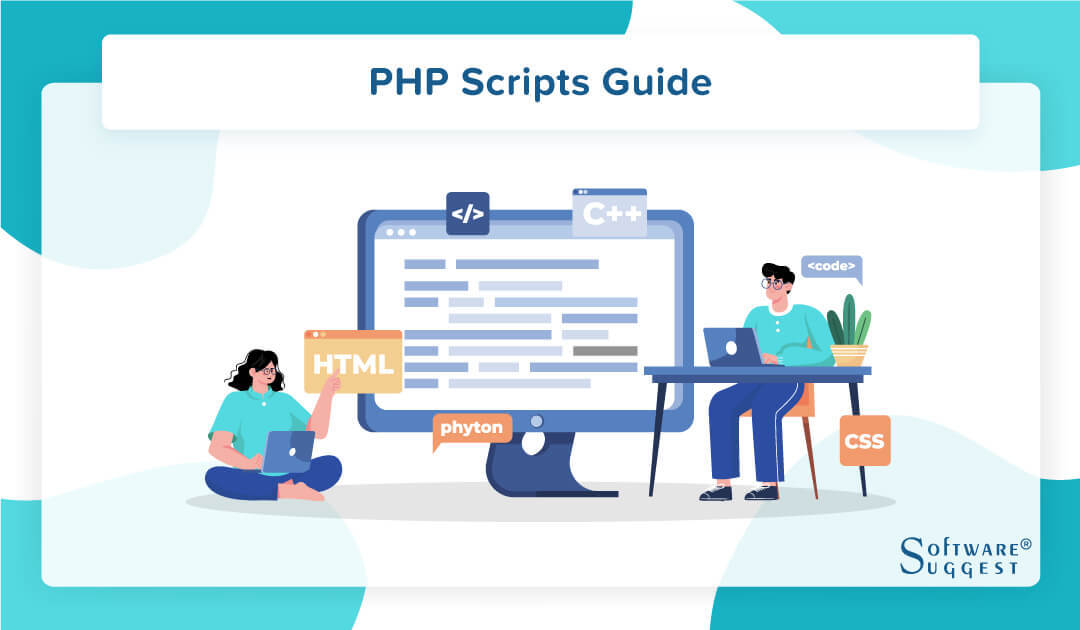
PHP is a scripting language that has become extremely popular in web development. It is an open-source language specifically designed for creating dynamic and interactive web applications. PHP scripts offer many powerful capabilities that make them an excellent choice for web development. Being user-friendly, syntax, and offering a broad range of functionalities have made it the go-to language for developers worldwide.
Its versatility and flexibility allow developers to create everything from simple web pages to complex web applications with ease. Continue reading if you wish to explore more about PHP scripts.
What is a PHP Script?
PHP script, a widely-used scripting language, is an acronym for Hypertext Preprocessor. It was first developed in 1994 by Rasmus Lerdorf as an open-source, interpreted language that enables dynamic and interactive web development.
One of PHP's unique features is its ability to embed code within HTML code, allowing web developers to execute various tasks within a web application. The standard way of beginning a PHP script code block is by using the "<?PHP" tag, while the code block ends with "?>".
This syntax helps to distinguish between PHP code and HTML code, enabling developers to create efficient and functional web applications without any issues. PHP is extensively used for creating diverse web solutions that range from simple blogging websites to complex eCommerce platforms.
PHP's robust capabilities enable developers to execute complex tasks with ease, allowing them to create both dynamic websites and interactive web applications efficiently.
Why Do You Need PHP Scripts?
PHP scripts are crucial for developing dynamic and interactive websites. PHP is a server-side scripting language that allows developers to create web pages and handle server-side tasks such as file handling, database interactions, and user authentication.
PHP offers several advantages, such as ease of use, versatility, a large community of developers, and it is free and open-source. Its ease of use makes it accessible to developers of all skill levels and a mere cakewalk for newbies to get their hands on this scripting language.
PHP's versatility enables it to be used for server-side scripting, command-line scripting, and even for creating desktop applications, making it a valuable tool for developers. PHP's syntax isn't only limited to creating dynamic web pages but can also be used for developing web applications and GUIs.
The latest versions of PHP, similar to PHP 7 and PHP 8, have adopted an object-oriented programming paradigm that facilitates the creation of secure and reusable frameworks and functions that are more dynamic and efficient. This approach encourages developers to write structured and organized code, making it easier to maintain and debug applications.
Different Applications Of PHP Scripts
PHP scripts are a versatile and flexible tool with a broad range of applications in various domains. Below are some of the most common applications of PHP scripts:
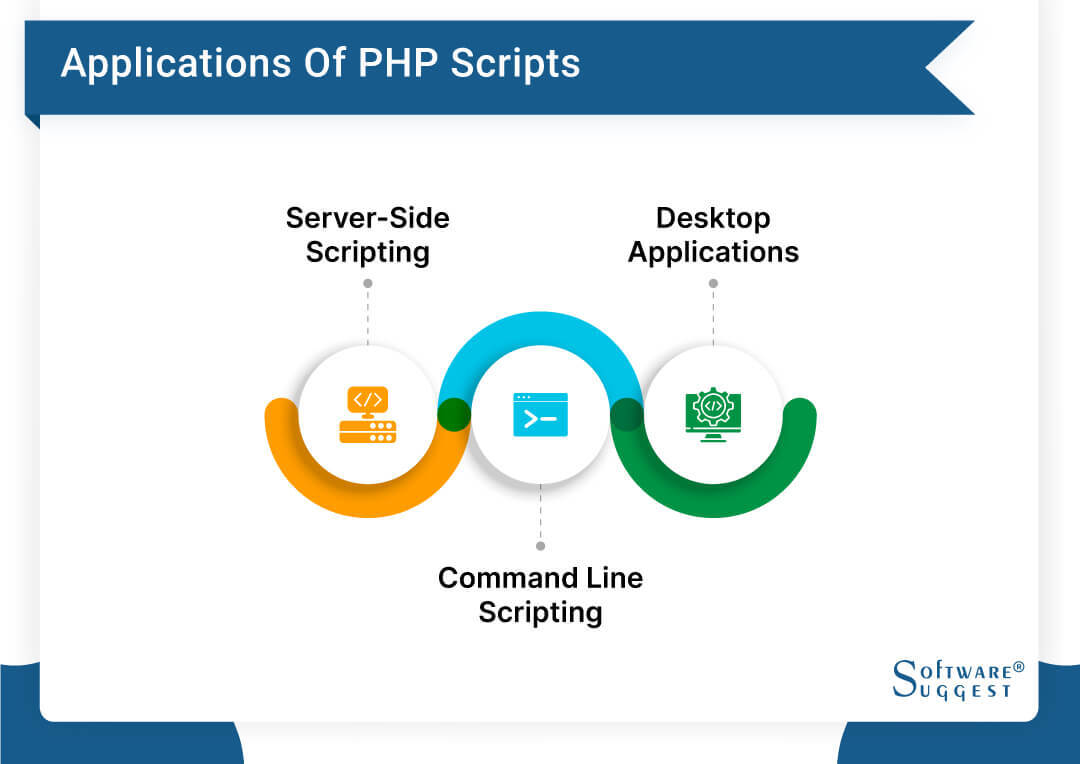
-
Server-Side Scripting
PHP scripts are extensively used for server-side scripting. They can easily create various dynamic web pages and handle various server-side tasks such as user authentication, file handling, and database interactions.
Ready-made PHP scripts seamlessly work with HTML, CSS, and JavaScript to create responsive web pages. To work on any page of your website with this kind of PHP script application, you just need a PHP Parser, a webserver (such as Apache), and a web browser extension like Google Chrome. -
Command Line Scripting
Developers can utilize PHP to create a wide range of command-line tools that extensively automate tasks like data manipulation, file management, and system administration. The command-line interface of PHP enables developers to execute multiple scripts directly from the terminal, making it a powerful tool for automation.
-
Desktop Applications
PHP scripts can be employed to create cross-platform desktop applications as well. By combining PHP with web technologies like HTML and CSS, developers can create desktop applications that can run on multiple operating systems.
These applications can be used for various purposes, such as data analysis, system monitoring, and project management. This scripting language does more than just output HTML. It can include different types of media, such as images, PDFs, videos, and sounds.
Additionally, PHP can automatically generate XHTML and XML files, making it a powerful tool for web development. This flexibility allows developers to create more dynamic and interactive websites that can handle a variety of media types.
How Do PHP Scripts Work?
When a user requests a web page from a server that supports PHP, the PHP script on the server is executed before the page is sent to the user's browser. The PHP script can easily perform a wide range of server-side tasks. This primarily includes deeply interacting with databases, manipulating data, and performing various file operations. The PHP code is then executed on the server and the resulting output is sent to the user's browser as HTML, CSS, and JavaScript.
PHP scripts are usually embedded in HTML files, and the server processes the PHP code and replaces it with HTML code. This process is widely known as parsing, and it enables PHP scripts to generate dynamic content based on user input, database queries, and other server-side operations.
So, this is how PHP scripts work. If you wish to start with PHP development, there are a few things to keep in mind. First and foremost, you need a development environment and a code editor. Download and install the latest XAMPP for your preferred platform, which includes the Apache web server and MySQL database. With XAMPP, you can simulate a web server on your PC or Mac.
You also need a code editor to write PHP code. Sublime Text 3 is a popular option that supports various programming languages, including PHP. Once you have your development environment and code editor set up, you can start writing PHP code and building various web applications.
Benefits Of PHP Scripts
When it comes down to PHP scripts, their benefits can make up a long list. Here are some of the most common ones among them. Let's take a look at them!
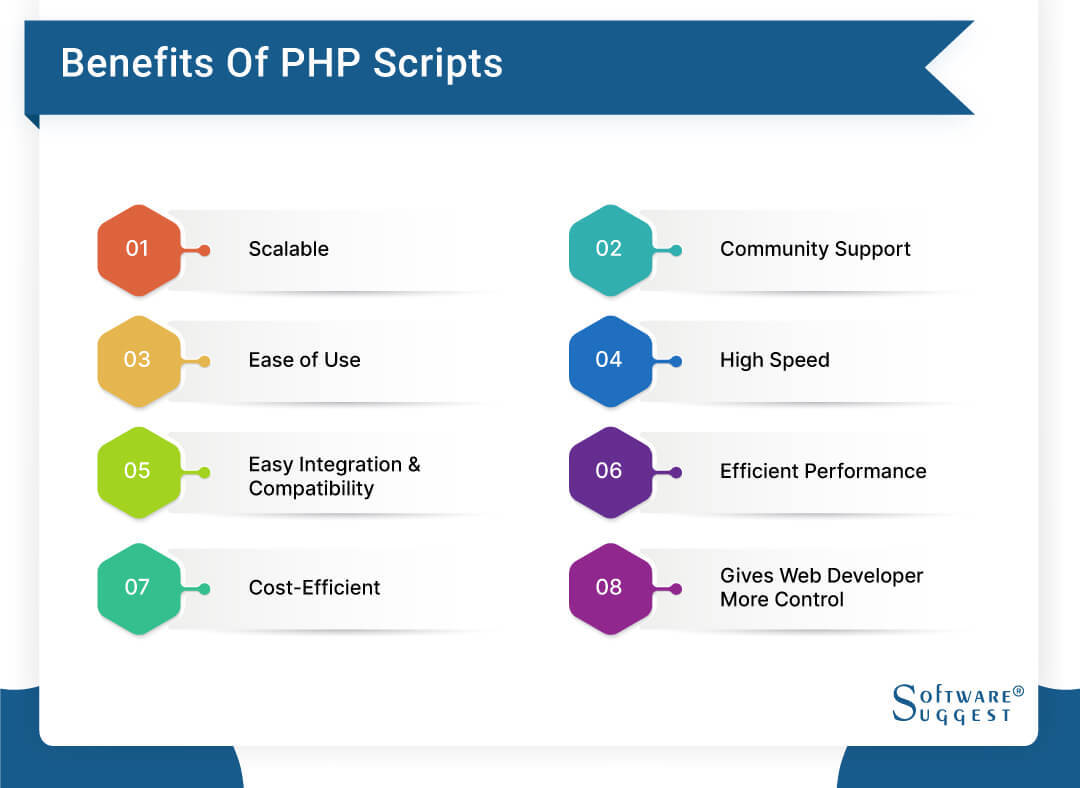
-
Scalable
PHP offers an excellent framework that is scalable, making it ideal for various types of large-scale web development projects. The scalability of PHP allows developers to create web applications that can handle a large number of users and complex business logic.
Various popular apps, including Facebook, WordPress, Tumblr, Yahoo, MailChimp, etc., were all created using PHP. With PHP scripts, developers can easily build applications that can grow with the needs of their organization. -
Community Support
The large and supportive community of PHP developers contributes to the development of this renowned programming language. This advantage provides numerous resources and learning materials that make it easy for developers to learn and use PHP.
The PHP community also offers support to developers, making it easier for them to troubleshoot issues and find solutions to problems. This means whenever you face a challenge while developing, you can quickly turn to the community for help and get support from multiple software developers across the globe. -
Ease of Use
When it comes down to PHP scripts, its ease of use advantage is one the most prominent ones. This makes it accessible to developers of all levels, including beginners. By offering a simple and easy-to-learn syntax, developers find this scripting language extremely easy to write and debug code. The language also offers multiple tools and frameworks that make it easy for developers to build robust web apps.
-
High Speed
Due to its lightning speed PHP is considered an ideal choice for web development projects that require high performance. Top PHP scripts are executed on the server, which means that the processing power of the server can be used to execute the PHP code. This results in faster execution times and enhanced performance. With PHP, developers can easily create web applications that are fast and responsive which results in enhanced user experience.
-
Easy Integration and Compatibility
PHP can be easily integrated with other technologies and frameworks. It is compatible with various operating systems and web servers, including Apache and Nginx. It can also be easily integrated with other programming languages, such as JavaScript, HTML, and CSS. Through this, developers can build web applications that are compatible with various platforms and devices.
-
Efficient Performance
The efficiency of PHP can be greatly improved, but this extensively depends on the coding methods employed by web developers. PHP offers coding scalability and can be used to build various applications. It is frequently the programming language of choice for websites with multiple web pages.
-
Cost-Efficient
PHP is an open-source language, which means that it is free to use and distribute. This makes it a cost-efficient choice for web development projects, as developers do not need to purchase any kind of expensive licenses or software. With PHP, developers can create high-quality web applications without making a hole in their pockets.
-
Gives Web Developer More Control
PHP provides web developers with increased control over the development process. Through this, they can create custom web applications that meet the needs of their clients. With PHP, developers can create custom solutions that are tailored to the needs of their clients. With this level of control, various user-friendly and unique web apps can be built.
Features of Ready-Made PHP Scripts
Web developers have increasingly favored ready-made PHP scripts due to their numerous benefits. These pre-designed and pre-coded web applications can be easily customized to meet specific needs. Some of the most common features of ready-made PHP scripts include the following:
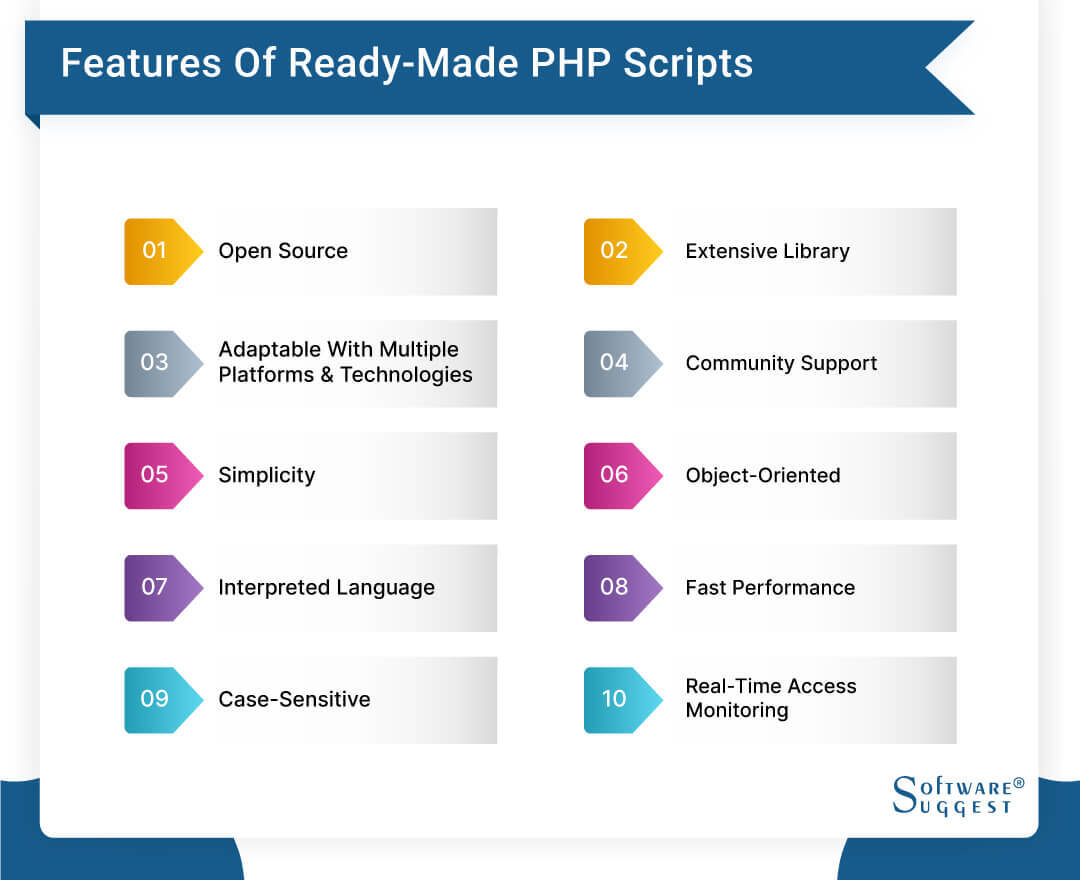
-
Open Source
PHP scripts are open source, enabling developers to access and modify the source code according to their requirements. Being open-source also means that developers can use these unique scripts without paying for licenses. This makes PHP a cost-effective option when it comes to web development.
-
Extensive Library
Ready-made PHP scripts provide a huge library of pre-built functions and modules that can be used to speed up the development process. These functions can be easily integrated into web applications, eliminating the need for developers to write complex code from scratch. The library also includes a range of plugins that further extend the functionality of the scripts.
-
Adaptable with Multiple Platforms and Technologies
Ready-made PHP scripts are designed to be adaptable to multiple platforms and technologies. They are compatible with other programming languages, such as HTML, CSS, and JavaScript. Since these are some renowned programming languages, through this, developers can create web applications that are compatible with different platforms/devices.
-
Community Support
Ready-made PHP scripts have a large community of developers who contribute to the development and maintenance of the scripts. These volunteers are crucial in overcoming language barriers in programming by translating open-source libraries into multiple languages to assist novice programmers.
Thanks to their dedication, a wide range of third-party open-source libraries are now accessible to the public, offering not only basic functionalities of programs, but also more advanced operations. -
Simplicity
Ready made PHP scripts come with an intuitive user interface that makes it easy for developers to customize and deploy web applications quickly. PHP is a well-structured programming language that offers a vast collection of predefined functions, which simplify the programming process. Unlike C, PHP does not require library inclusion, and its built-in functions make it easy to optimize.
-
Object-Oriented
Being written in object-oriented programming, PHP scripts are designed to be modular and reusable. This makes it easy for developers to create web applications that are easy to maintain and extend.
In PHP5, the object-oriented programming feature was primarily introduced. This allowed for the development of intricate and reusable web pages. This attribute also places PHP on the same level as other dominant object-oriented programming languages, such as Java and Python. -
Interpreted Language
PHP is an interpreted language, which means that the scripts are executed directly by the server without the need for compilation. This results in faster development cycles and quicker deployment of web applications.
The interpreted nature of PHP also makes it easier for developers to debug and test their code. Additionally, dynamic typing and small executable program sizes are also some of the most prominent benefits served by interpreted languages. -
Fast Performance
Cool PHP scripts are executed on the server, which means that the processing power of the server can be used to execute the code. This results in faster execution times and improved performance. With PHP, developers can create web applications that are fast and responsive, providing an excellent user experience.
-
Real-Time Access Monitoring
Ready-made PHP scripts come with real-time access monitoring, allowing developers to monitor the performance and usage of web applications in real-time. PHP's user management system is designed to mainly ensure secure access to restricted areas, restricting unauthorized access to files while providing detailed summaries of recent user activity.
-
Case-Sensitive
PHP is a case-sensitive language, which means that the capitalization of letters in variables, functions, and classes matters. This ensures that the code is error-free and runs smoothly. PHP function names are not case-sensitive, but the ones that are included are written below.
- Variable names
- Constructs (if, if-else, if-elseif, while, do-while)
- Keywords (such as true and false),
- User-defined functions & class names
How To Choose The Best PHP Scripts?
PHP scripts can save tremendous time, effort, and resources while ensuring efficient web development. However, choosing the most suitable PHP scripts can be daunting at times, especially for inexperienced developers. Following are some of the essential things to keep in mind when choosing the best PHP scripts. Let's dig deep!
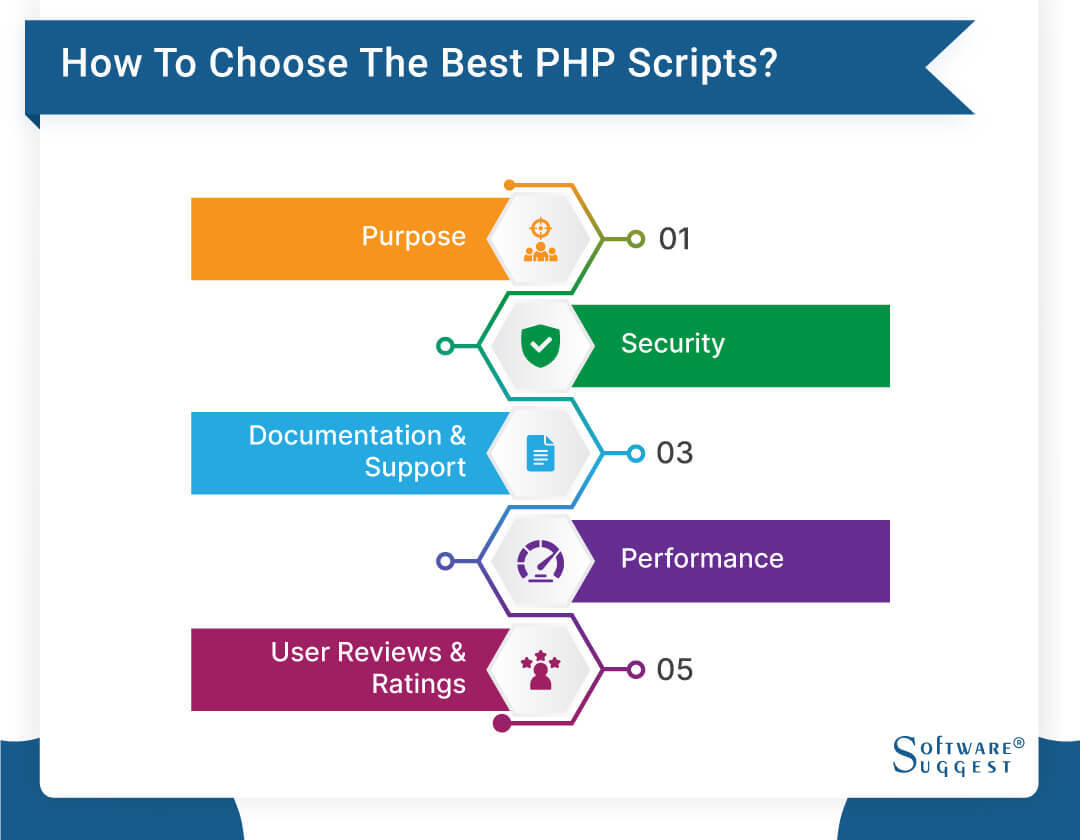 trends in
trends in
-
Purpose
When you have a clear purpose in your mind, choosing the perfect PHP scripts is no more a difficult task. Make sure that the chosen script aligns with the requirements of the web application. Always look for scripts that offer the required functionality and check for any potential compatibility issues with other application elements.
-
Security
Security is a highly critical aspect of web development. Therefore, always stay on the lookout for scripts that have undergone thorough testing and have a good reputation for being secure. Check for any known vulnerabilities or reported issues.
-
Documentation and Support
Scripts with clear documentation and highly reliable support channels can make the development process way easier. Look for scripts with comprehensive documentation and a responsive support team.
-
Performance
Optimized scripts can extensively enhance the speed and efficiency of any web application. By choosing scripts with a good performance reputation and checking for any potential issues that may affect performance, you can land on the perfect alternative.
-
User Reviews and Ratings
Reviews and ratings from other users can provide valuable insights into the quality and functionality of the script. Hence, take advantage of this factor while choosing PHP scripts.
Top 5 PHP Scripts Comparison
There are a wide range of options when it comes down to PHP scripts. Some of the most popular PHP scripts are written below. Let’s take a look at them.
|
Name
|
Free Trial
|
Demo
|
Pricing
|
|---|---|---|---|
| 30 Days |
Yes |
$249/month | |
|
NuSphere PhpED |
14 Days |
Yes | On-Request |
|
No |
Yes |
$18/month | |
| 30 Days |
Yes |
$189/month | |
|
30 Days |
Yes |
Free to use |
1. PhpStorm
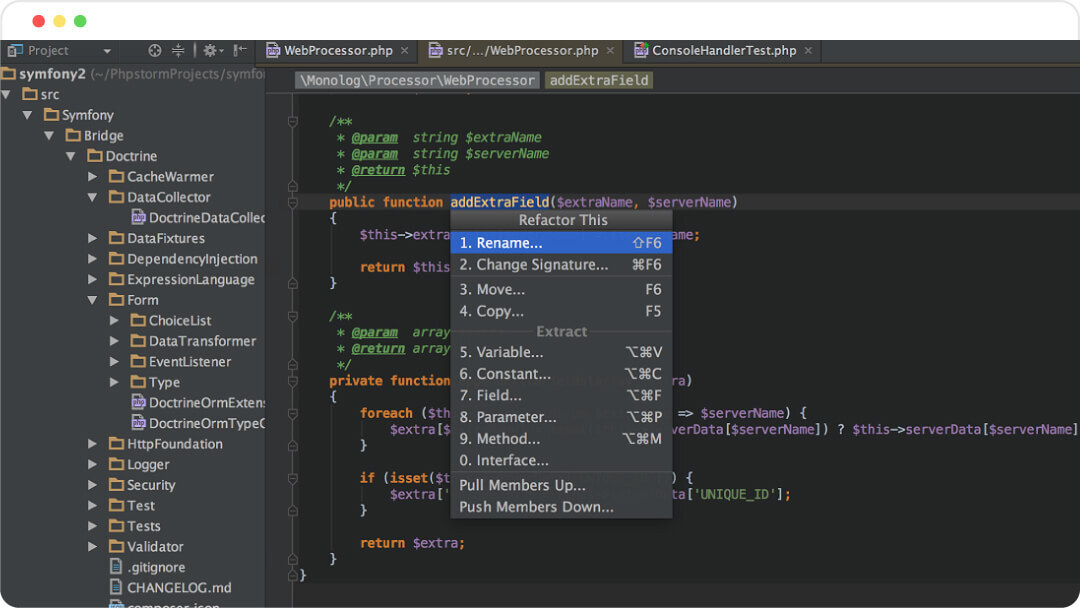
PhpStorm serves as an integrated development environment (IDE) tailored specifically for PHP programming. By offering a unified interface, it provides developers with the necessary tools to proficiently manage programming, testing, debugging form data, and complete tasks. This ultimately results in improved efficiency and productivity.
PhpStorm Features
- GIT integration
- JS framework integration
- Code navigation
PhpStorm Pros
- Free trial
- Code quality analysis
- Profiling
PhpStorm Cons
- Uses more RAM while running
- Multiple functions that can't be used well
PhpStorm Pricing
- PhpStorm (Organization) - $249
- All Product Pack (Organization) - $779
- PhpStorm (Individual use) - $99
- All Product Pack (Individual use) - $289
2. NuSphere PhpED
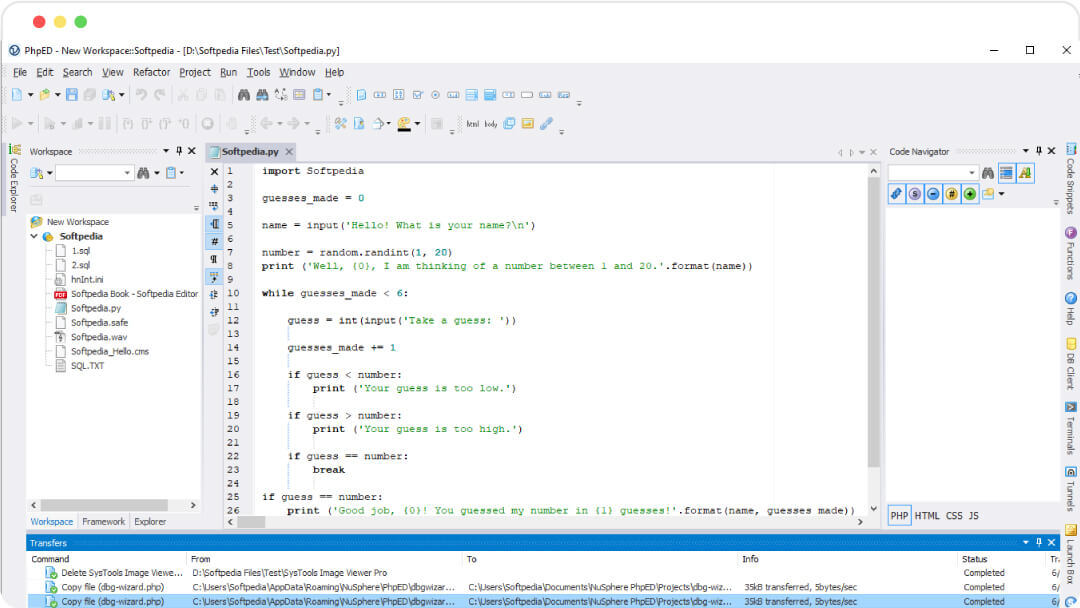
The NuSphere PHP IDE is a popular platform that boasts a code editor, debugger, database connectivity client, and deployment capabilities. It is a complete development environment that fully supports PHP, HTML, CSS, XML, SMARTY, and XHTML, providing advanced developers with comprehensive solutions to meet their needs.
NuSphere Features
- Dynamic syntax highlighting
- Code templates
- Inline HTML validator
NuSphere Pros
- Fast search capabilities
- Unparalleled debugging productivity
- Embedded terminal client (Telnet and SSH)
NuSphere Cons
- No native IDE for macOS
- Does not transfer licenses between different OS
NuSphere Pricing
- On request
3. Apache NetBeans
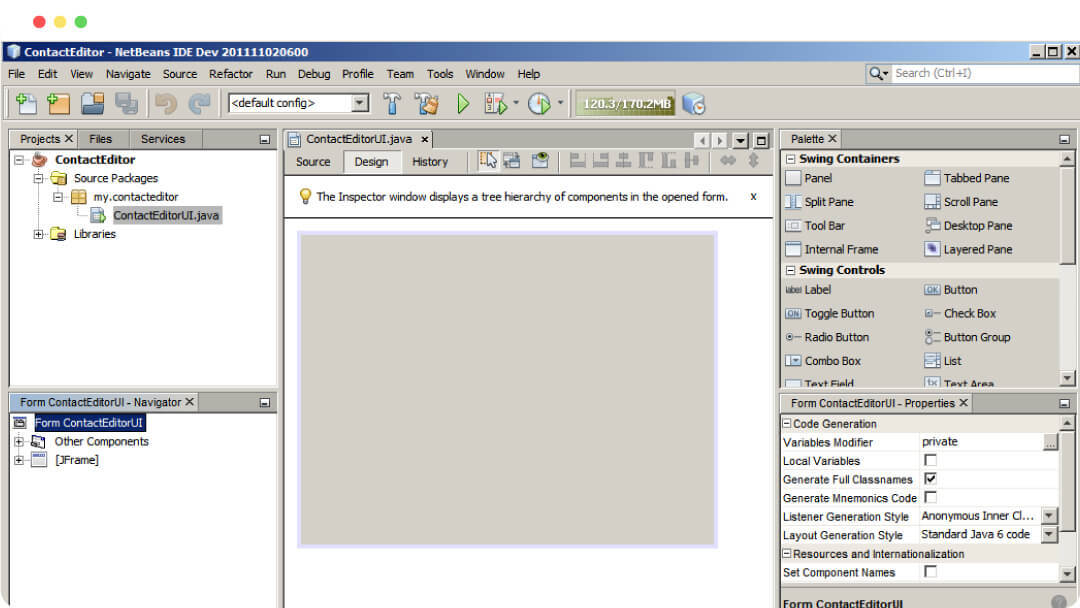
Apache NetBeans is much more than a simple text editor. It supports a wide range of programming languages such as Java, PHP, and others, providing programmers with editors, wizards, and templates that significantly improve their productivity.
Apache NetBeans Features
- Free & open-source platform
- Syntax-based source code
- Semantic analysis
Apache NetBeans Pros
- Excellent for Java Applications
- Efficient code suggestions
- Great community support
Apache NetBeans Cons
- Not good with memory usage
- Complicated instructions
Apache NetBeans Pricing
- On request
4. Zend Studio
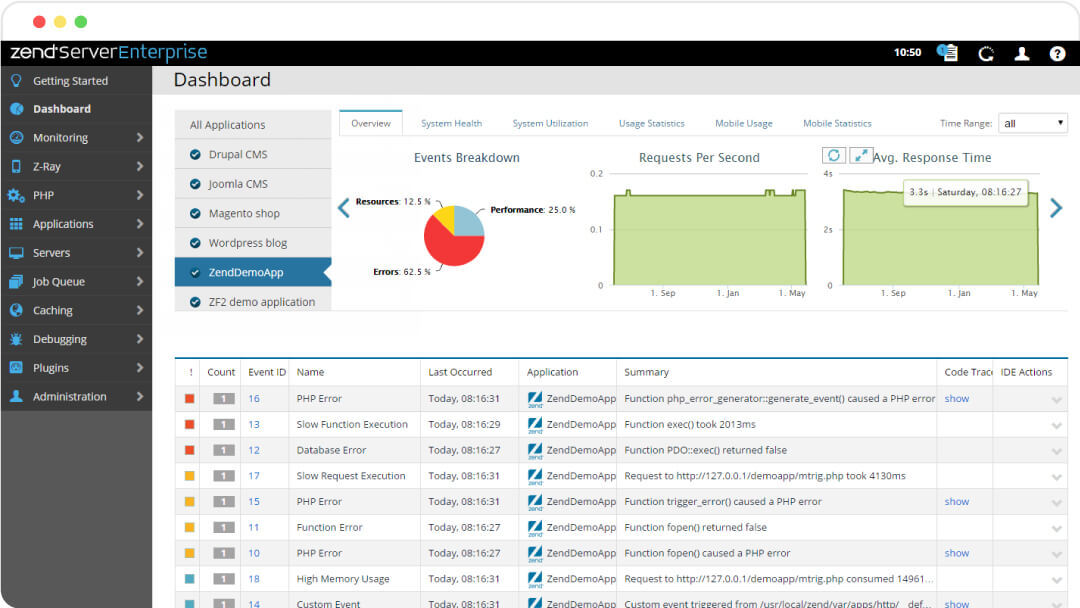
Zend Studio is a cutting-edge PHP editor that empowers developers to create outstanding web and mobile applications using PHP.
Through its fully integrated development environment, it boosts the productivity of web and mobile app developers by enabling faster coding and optimal utilization of PHP 7 - the latest version of the server-side scripting and general-purpose programming language.
Zend Studio Features
- Debugging and PHP profiler
- Web server integration
- Framework support
Zend Studio Pros
- Advanced debugging
- Streamlined unit testing
Zend Studio Cons
- Not budget-friendly
- Interface can be improved
Zend Studio Pricing
- On request
5. Aptana
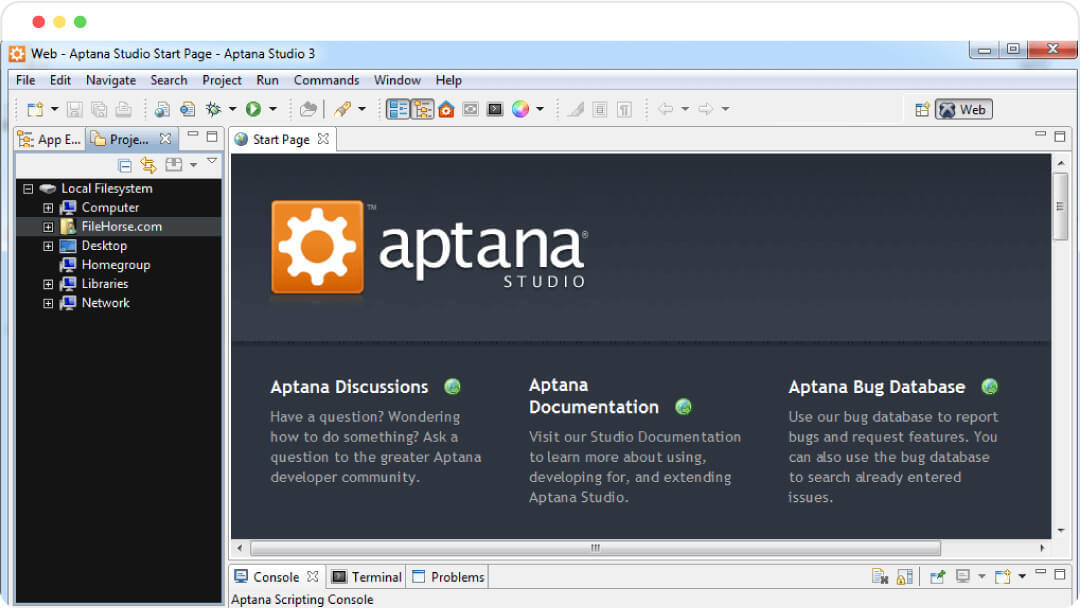
Aptana is a software solution that encompasses all aspects of app development aimed at meeting the requirements of enterprises and agencies. It provides comprehensive and tailored solutions that are specifically crafted for web app development. With a web-based interface, Aptana offers a centralized platform for debugging and web app development software.
Aptana Features
- Deployment wizard
- Built-In terminal
- IDE customization
Aptana Pros
- Reporting/analytics
- Code-free development
Aptana Cons
- Slow searching capabilities
- Lightweight frameworks
Aptana Pricing
- Free
Disadvantages of PHP Scripts
PHP, a server-side scripting language that has been around since 1995, is widely used for web development and dynamic website and web application creation. Despite its popularity, PHP has several disadvantages that make it less suitable for certain types of web development projects.
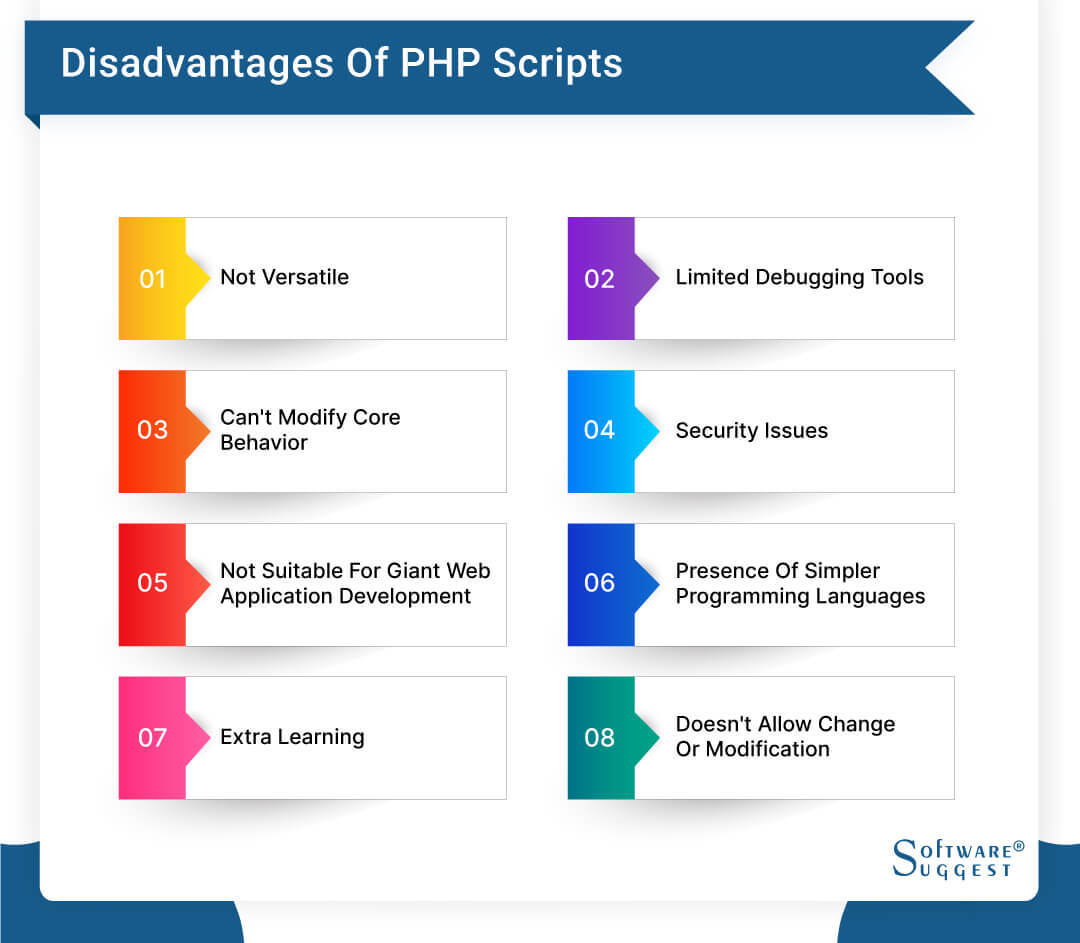
-
Not Versatile
PHP is not as versatile as other programming languages. It is primarily used for web development and has limited functionality outside of that scope. Additionally, PHP is not well-suited for creating complex desktop applications, mobile applications, or other non-web-related software.
-
Limited Debugging Tools
Debugging is an essential part of the software development process, and without proper debugging tools, it can be challenging to identify and fix errors in the code. While there are some debugging tools available for PHP, they are not as robust as those available for other languages, such as Python or Java.
-
Can't Modify Core Behavior
Though PHP is an open-source language, it does not allow developers to modify the core behavior of the language. This means that if a developer wants to change how PHP handles a specific function or feature, they cannot do so without modifying the source code directly.
-
Security Issues
PHP has been known to have security issues in the past, and it continues to be a concern for developers today. One of the reasons for this is that PHP is a popular language, which means that it is a target for hackers and cybercriminals. Moreover, PHP has some inherent security flaws, such as its weak typing system, which can make it easier for attackers to exploit vulnerabilities.
-
Not Suitable for Giant Web Application Development
PHP is not suitable for developing large-scale web applications. While it is possible to create large web applications using PHP, it is not the best choice for such projects.
-
Presence of Simpler Programming Languages
There are simpler programming languages available, such as Ruby and Python, that are easier to learn than PHP. This can be a disadvantage for developers who are just starting and are newbies in the field of web development.
-
Extra Learning
If a developer wants to use PHP for web development, they will need to learn additional technologies like HTML, CSS, and JavaScript. This can be very time-consuming and add an extra layer of complexity to the development process.
-
Doesn't Allow Change or Modification
As mentioned earlier, PHP does not allow developers to modify the core behavior of the language. Due to this, developers cannot customize the language to fit their specific needs. This can be a major disadvantage for all those who require a high level of customization.
Market Trends in Ready-Made PHP Scripts
Market trends in ready-made PHP scripts refer to the recent developments and advancements in the market for pre-built PHP scripts that are commonly used for creating various web applications. Some of the most prominent market trends in ready-made PHP scripts include:
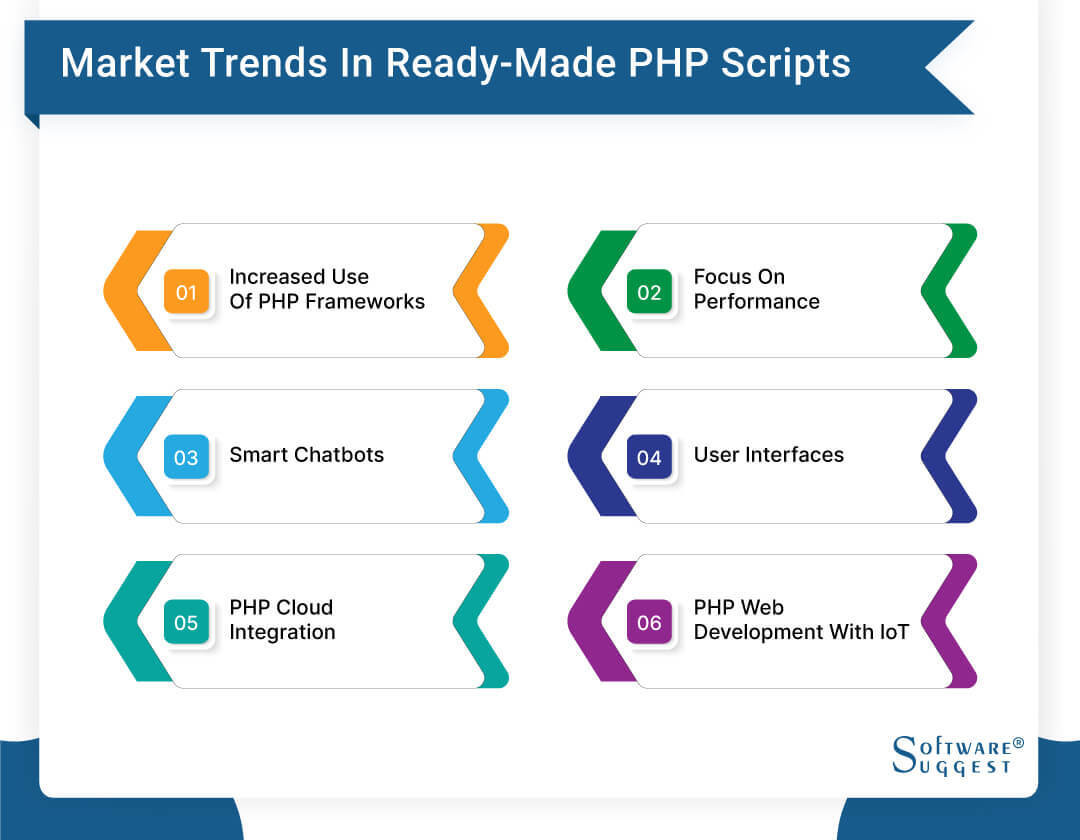
-
Increased Use of PHP Frameworks
PHP frameworks are increasingly being used by businesses and developers to build web applications. PHP frameworks like Laravel, Symfony, and CodeIgniter offer a standardized approach to developing applications with database integration, user authentication, and routing. This enables developers to create complex applications quickly and efficiently without having to start from scratch each time.
-
Focus on Performance
The need for reliable and fast scripts is being driven by the complexity of web applications. Because of this, programmers are searching for pre-built, optimized PHP scripts that load quickly and use little memory, especially for applications that need to handle lots of traffic or big datasets.
-
Smart Chatbots
Chatbots are gaining widespread popularity among businesses as a leading tool for quickly addressing customer issues and responding to their inquiries in a convenient manner. They allow customers to interact with them in the same way as they would with humans, such as for inquiries, information, technical issue resolution, document retrieval, and general guidance.
PHP can make a significant contribution to the development of smart chatbots that offer faster and simpler ways to resolve customer inquiries. -
User Interfaces
A user-friendly and responsive interface is critical for a website's success. There is a growing trend in PHP web development toward user-centricity, with websites competing to create interfaces that are convenient and easy to use.
The first impression that visitors have of a website's interface is mainly critical, as a negative experience can harm a brand's image. It is possible to create high-quality web applications or websites with visually appealing and user-friendly interfaces with the assistance of reliable PHP web development services. -
PHP Cloud Integration
The integration of PHP with cloud technology has the potential to deliver exceptional web solutions that cater to various business needs. Combining PHP with cloud technologies can provide numerous advantages to businesses looking to build web solutions that are flexible, scalable, and cost-effective.
The integration of these technologies allows businesses to leverage their respective strengths, resulting in robust web applications and websites. Moreover, the integration of PHP scripts and cloud technologies offers several benefits to the business community. These mainly include improved performance, enhanced security, and increased accessibility. By taking advantage of the synergy between PHP and cloud technologies, businesses can achieve their goals more efficiently and effectively, ensuring long-term success. -
PHP Web Development with IoT
The Internet of Things (IoT) is a rapidly evolving technology that enables a suite of interconnected devices. PHP, as a dynamic web programming language, is well-suited to support IoT. Integrating PHP scripts with IoT is an emerging trend in PHP web development, and it is expected to gain momentum in the near future. Popular PHP frameworks like Laravel, CodeIgniter, and Symfony are particularly suitable for implementing IoT solutions.
By combining the strengths of both technologies, businesses can develop innovative and powerful IoT applications and devices that enhance efficiency, productivity, and convenience. As PHP continues to advance, we can expect to see more progress in the integration of PHP with IoT, making it an exciting area for future growth and innovation.
Conclusion
PHP remains a top contender for creating dynamic websites and web applications due to its developer support and ease of use. Furthermore, because simple programming languages are available, it is accessible to developers of all skill levels. However, in order to fully utilize PHP and create secure, reliable web applications that meet their specific requirements, developers must stay up to date on the most recent updates and best practices. With our expert teams, we can help you with a better understanding of PHP scripts and how you can develop one. Connect with our experts today!
FAQs
PHP scripts are typically kept in the document root directory of a web server or in one of its subdirectories. This location acts as the primary directory that the web server searches when looking for files to respond to client requests.
The document root's exact path varies depending on the web server software and its configuration. For instance, the Apache HTTP Server commonly uses a directory named "htdocs" or "public_html" to store the document root within the server's file system.
Once the best PHP scripts are placed in the document root or one of its subdirectories, they can be accessed by clients through web browsers or other HTTP clients by providing the appropriate URL that corresponds to the script's location on the server.
To execute PHP scripts, a web server must have the PHP engine installed. Once a client requests a PHP file, the web server forwards it to the PHP engine for processing.
The PHP engine then reads and understands the PHP code, creating HTML output, which is returned to the client's browser. In addition, PHP scripts can communicate with databases, file systems, and other server resources, allowing them to create dynamic web pages and applications.
In order to facilitate codebase maintenance and updates, PHP scripts can reuse code stored in other files by including them using include() or require() statements.
The include() statement basically adds a file to a PHP script. If the file is not found, a warning is displayed, but the script continues executing. In contrast, the require() statement adds a file to a PHP script but causes the script to halt with a fatal error if the file is not found.
Additionally, PHP offers include_once() and require_once() statements that guarantee a file is included only once in the script, preventing errors caused by duplicate declarations.















